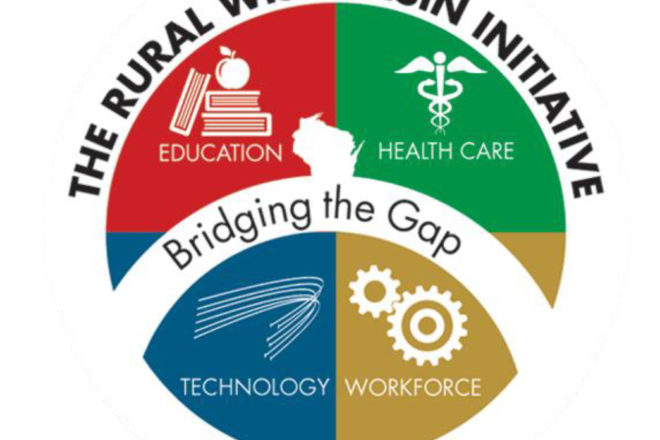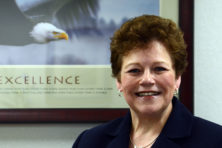Republican Legislators Propose Rural Initiatives
- Share
- Tweet
- Pin
- Share

Rep. Joel Kitchens is part of a group of rural Republican legislators who will introduce a package of initiatives they believe are essential for the future of the rural constituencies they represent.
“We’re facing a crisis in the rural areas,” Kitchens said at a meeting he requested with the Peninsula Pulse and Door County Medical Center President and CEO Gerald Worrick.
Kitchens said in the legislative session that begins in January, the 21 legislators will introduce the Rural Wisconsin Initiative, with several key components necessary to the overall health of rural communities (see sidebar below for details).
Kitchens said the idea for this strength-in-numbers approach to rural issues developed naturally through discussion among the rural legislators, who, he said, realize, “If we don’t get going on this, our rural areas are just going to die. It’s all about economic development in our rural areas.”
Education and health care are two key issues the legislators identified as important to their communities, which was music to Worrick’s ears.
“The biggest thing here is the legislature recognized that there is a problem and we need to begin looking at it,” Worrick said.
“When you look at the demographics, projection of ages, it’s a little scary. We’re a very, very old county,” Kitchens said.
To meet the future health care needs of Door County and other rural counties, local health care organizations must be able to offer incentives to attract health care professionals to the area. One of the incentives the Rural Health Initiative proposes is called a rural opportunity zone, which offers college debt reduction for qualified individuals – in this case, health care professionals and teachers. The idea is modeled on successful programs used in rural communities in other states, including Greeley County, Kansas, which at a population of about 1,250 makes it the least populous county in the state.
“For Greeley County, the Rural Opportunity Zone (ROZ) program provides an important student loan payback incentive for educated and trained individuals interested in building their life and careers in our rural community. When they relocate here, they bring their spouses and children with them, growing our population and increasing school enrollment,” said Christy Hopkins, director of Greeley County’s Community Development.
She noted that all the program participants are less than 40 years old, so aside from filling key roles in the community, “they and their peers bring life, vibrancy and activity to Greeley County.”
“We don’t see the ROZ program as ‘the answer’ to our community’s challenges. Rather, it is an important tool in an overall strategy to create a community that people are proud to call home,” Hopkins said.
Worrick noted that including broadband on the rural agenda is a wise move.
“I don’t think rural Wisconsin understands the importance of broadband to economic activity,” he said. “It’s the same as rural electrification in the 1930s.”
The link between broadband access and economic development is mounting. For example, a recent report in Minnesota found that state’s economy could grow by $517 million for every one-percentage increase in broadband adoption.
However, Elise Nelson, communications and legislative director of the Public Service Commission of Wisconsin, said the most recent federal figures (from 2014) show that while 98.9 percent of Wisconsin’s urban residents have access to broadband service at the FCC benchmark download speed of 25 megabytes per second, only 56.4 percent of the state’s rural residents have that access.
“We’ll be bringing these all forward in the first few weeks of the session, and if people can take part in the hearings, that will help,” Kitchens said. “The more the public is behind it, the more likely it is to go forward. We have good momentum and good leadership.”
THE ISSUES
- Employment Development: To reverse the trend of young people leaving the area, young people need to be exposed to the variety of good careers available in rural areas. Increasingly, this is being accomplished through apprenticeship partnerships. To encourage these partnerships, the RWI legislators propose increasing the funding for Youth Apprenticeship Grant in fiscal year 2016-17 by $500,000 and for the Apprenticeship Completion Award program by $150,000. This is a 22 percent and 67 percent increase, respectively. These increases will bring both programs into line with current demand, and further increases should be explored should demand continue to increase.
- Bolstering the Rural Workforce: Maintaining the current population alone is not enough to reverse the population stagnation trend in rural Wisconsin. The state must also work to attract young workers from out of state. To that end, they are proposing the creation of rural opportunity zones, a concept pioneered in Kansas and Oklahoma, that would incentivize young people looking to relocate after finishing their post-secondary education. In their vision of the program, Wisconsin would repay up to $25,000 or 40 percent of a new resident’s student loans, provided the new resident maintains a full-time job, avoids public assistance, attained a post-secondary degree, and settled in a county that fit the Federal OMB’s definition of rural.
- Investing in a Healthy Rural Wisconsin: With the impending retirement of the baby boom generation, health care access will increase in importance for a large segment of the population, many of whom will be seeking an ideal place to spend their retirement years. With this understanding, the legislature created the Wisconsin Rural Physician Residency Assistance Program in 2010. The program funds residency opportunities in rural Wisconsin communities, with the understanding that a physician would be more likely to practice medicine in a setting similar to the one where they received their training. In 2015, the program awarded nearly $600,000 in grants to rural hospitals, and had a hand in funding 77 of the state’s 83 rural physician residency and fellowship positions (93 percent). A $250,000 increase in program funding would allow the program to maintain its current service base, while expanding to provide residency programs for doctors pursuing obstetrics and gynecology specialties.
- Attracting Teachers to Rural Wisconsin: In 2013, the Speaker’s Task Force on Rural Schools identified teacher retention as a key goal to be addressed by future legislation. The Wisconsin Association of School Boards has advised that loan forgiveness is an effective means of attracting teachers to the field without directly changing teacher compensation; we leave more money in new teachers’ pockets and reduce one of the primary stressors while maintaining direct compensation. Schools statewide need a broader pool of candidates from which to pull; expanding the loan forgiveness program will serve to provide the “tipping point” to students who want to stay in their communities to enter education programs.
- Expanding Broadband in Rural Wisconsin: High-speed internet access has become a necessity. Increasingly, educators are having students use the internet to complete assignments, businesses require high speed internet to connect with consumers, and ambulances must be able to share information with hospitals in an efficient manner. Those who do not live in an area with broadband access are in danger of being denied equality of opportunity. In the most recent state budget, demand necessitated that an increase in the broadband expansion grant program. Currently, $6 million is available, but only $1.5 million is allowed to be allocated per fiscal year. Demand greatly outpaces supply. LRB-4210 would increase funding for broadband expansion to $10 million, thus enabling Wisconsin’s rural communities to compete on a level playing field.
Check out the state broadband maps for more information: http://www.broadbandmap.wisconsin.gov.
Legislators involved
Rep. Joan Ballweg, Markesan
Rep. Kathy Bernier, Chippewa Falls
Rep. Ed Brooks, Reedsburg
Rep. Mary Czaja, Irma
Rep. James Edming, Glen Flora
Rep. Joel Kitchens, Sturgeon Bay
Rep. Scott Krug, Nekoosa
Rep. Bob Kulp, Stratford
Rep. Tom Larson, Colfax
Rep. John Macco, De Pere
Rep. Jeff Mursau, Crivitz
Rep. John Murtha, Baldwin
Rep. Lee Nerison, Westby
Rep. Todd Novak, Dodgeville
Rep. Al Ott, Forest Junction
Rep. Warren Petryk, Eleva
Rep. Romaine Quinn, Rice Lake
Rep. Keith Ripp, Lodi
Rep. John Spiros, Marshfield
Rep. Rob Swearingen, Rhinelander
Rep. Gary Tauchen, Bonduel
Rep. Nancy VanderMeer, Tomah

